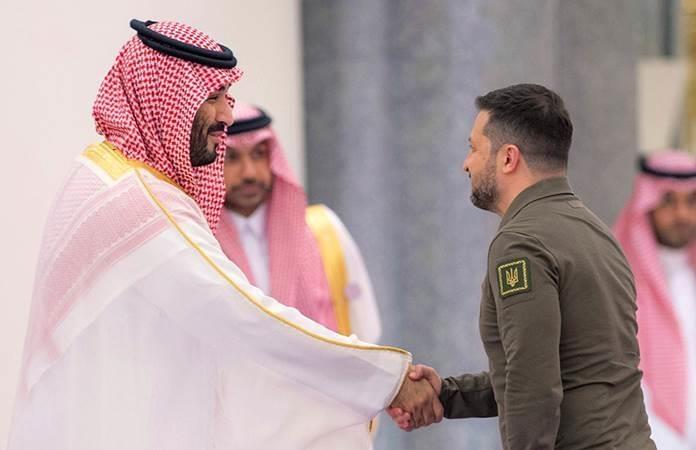Regarding Zelensky’s participation in the recent meeting of the Arab League, it is important to pay attention to the following points:
The first point; for the first time in the history of the meetings of the Arab League, a non-Arab president from outside the region, whose country is involved in a full-scale war, participated in the annual meeting of the heads of states of the League. The most “ponderable” point of the 32nd Arab League Summit was Zelensky’s presence and speech.
Zelensky was officially invited to the Jeddah meeting by Saudi Arabia and bin Salman personally as the host, and the Arab League had no role in it. In addition, his trip to Saudi Arabia and his participation in the Jeddah meeting were his apparent deviation from this “basic strategy” that Ukraine interacts only with European and the US allies who are against Russia in the field of war, not with countries that are either neutral in this war or support Russia!
The second point; bin Salman’s relations with Western countries are still overshadowed by the murder of Khashoggi in 2018. Therefore, inviting Zelensky was to send this political message to Western countries that Saudi Arabia is still an active and dynamic player in the world that can be counted on!
Of course, bin Salman’s “ambitious goals” were also not without influence in this invitation, including showing the ability of Riyadh as the leader of Arab countries to manage significant cases at the international level, trying to act in the field of crises created between the Eastern and Western powers and mediating Russia’s most significant foreign policy crisis with the West in the post-World War II period. According to the Saudi Crown Prince, realizing such goals plays a vital role in improving and promoting the position of Saudi Arabia as an important country and bin Salman as a political leader in regional and international equations.
The third point; Arab countries, which are famous for having huge oil and gas reserves in the world, are “good options” for the war-torn country of Ukraine, which is in dire need of financial, economic, and energy assistance. For this reason, Zelensky tried to gain the support of Arab countries at the Arab League meeting by inciting the members and presenting a “justified image” of himself and his country. He said in front of Arab League leaders that he was confident they could unite to save people from Russian prisons. Unfortunately, he added, there are some people in the world and here among you who have closed their eyes to those illegal prisons and illegal extensions.
The fourth point; despite all the efforts that Zelensky made to turn his presence at the Jeddah meeting into an “achievement” for Ukraine, he failed to achieve the expected results. Putin’s message was read in the meeting, which emphasized the development of friendly relations and cooperation between Moscow and Arab countries. This message will make the Arab countries and even Riyadh (assuming they want to be) more “cautious” in helping Ukraine.
Also, many Arab countries have a neutral policy towards the war in Ukraine, and at the same time, they are happy with the expansion of Russia’s influence in the Arab region and West Asia; some of them, like Egypt (by sending missiles) and Syria openly support Russia. Meanwhile, the content of Arab leaders’ statements and the 5-page Jeddah Declaration, and the 110-page resolutions of the Summit were set in such a way that there is “no commitment” to Ukraine and in response to Zelensky’s remarks.
In addition, Arab countries, especially Saudi Arabia, have started the process of “de-escalation” in the region and are focused on their internal issues. Therefore, they cannot “play a role” in the Ukraine war. In this context, serious political and international obstacles and considerations do not allow such an issue.
The fifth point; Zelensky’s speech at the Arab League summit has some consequences. First, it was in “contradiction” with the neutral position of the Arab countries towards the war in Ukraine. Second, he questioned the goals and motto of the meeting, which was held with the theme of “peace and reconciliation.” Third, it affected the proceedings of the meeting to such an extent that the members and their affiliated political and media circles openly expressed their “discomfort” with Zelensky’s presence. Fourth, it “distorts” the possible results and achievements of the Summit, which happened to be held at a suitable time, favorable location, and good regional atmosphere. Fifth, it strengthens the proposition in the Arab and regional public minds that the Arab League is an Arab organization under the command of Saudi Arabia! And finally, it disrupts the process of regaining the position of the League, in which Bashar Assad was present after 12 years.
And the final point is that after ten years of being caught in a series of security, military and political crises that have weakened their power and position and created problems for them internally, the Arab League and some leading Arab countries are trying to “reskin.”
The process started in the Arab Union and among Arab countries is desirable. If it continues, it will reach good regional results and achievements unless it “neglects” and gets caught up in the Ukraine issue.
De-escalation in the region, including in Syria, Yemen, and other Arab countries, is not in the US favor at all and prevents any opportunity to “weaken” this process and its effects and results. Zelensky’s presence in the Arab League meeting is definitely not in the interests of Arab countries and regional order and security; therefore, it may be a “punitive trap” that the US has set for Arab countries.










0 Comments